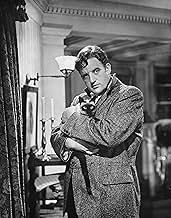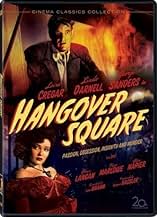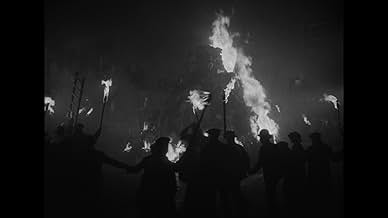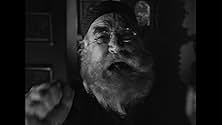VALUTAZIONE IMDb
7,3/10
4385
LA TUA VALUTAZIONE
Aggiungi una trama nella tua linguaA promising classical musician finds his life poisoned by a music hall dancer -- and by the strange gaps in his memory.A promising classical musician finds his life poisoned by a music hall dancer -- and by the strange gaps in his memory.A promising classical musician finds his life poisoned by a music hall dancer -- and by the strange gaps in his memory.
- Regia
- Sceneggiatura
- Star
- Premi
- 2 vittorie totali
Harry Allen
- Pot Man
- (non citato nei titoli originali)
Radford Allen
- Boy
- (non citato nei titoli originali)
Jimmy Aubrey
- Drunk
- (non citato nei titoli originali)
J.W. Austin
- Det. Insp. King
- (non citato nei titoli originali)
Brandon Beach
- Concertgoer
- (non citato nei titoli originali)
Wilson Benge
- Waiter
- (non citato nei titoli originali)
Frank Benson
- Newsman
- (non citato nei titoli originali)
Arthur Berkeley
- Pub Patron
- (non citato nei titoli originali)
Ted Billings
- Pub Patron
- (non citato nei titoli originali)
Lulu Mae Bohrman
- Concertgoer
- (non citato nei titoli originali)
Clifford Brooke
- Gas Company Watchman
- (non citato nei titoli originali)
Bob Burns
- Concertgoer
- (non citato nei titoli originali)
Recensioni in evidenza
Famous Composer George Harvey Bone (Laird Cregar) turns from gentle giant to violent murdering psychopath when prompted by certain sounds - he can then recall nothing. Into his life comes tricky nightclub singer Linda Darnell who uses him to write popular songs that she can use / sell - he becomes bewitched.
Glorious piece of Grand Guignol evoking Jekyll and Hyde and a foggy, chestnut roasting London. The story is well played out and full of memorable scenes without going over the top. At the centre of it all is Cregar, hugely impressive as both a sweet, gentle man and an evil killer. He is well supported by Darnell who is good at being bad and George Sanders as the psychiatrist / amateur detective. Bernard Herrman's score is one of his best and used well throughout, but particularly in the climactic scene which is truly terrific.
Glorious piece of Grand Guignol evoking Jekyll and Hyde and a foggy, chestnut roasting London. The story is well played out and full of memorable scenes without going over the top. At the centre of it all is Cregar, hugely impressive as both a sweet, gentle man and an evil killer. He is well supported by Darnell who is good at being bad and George Sanders as the psychiatrist / amateur detective. Bernard Herrman's score is one of his best and used well throughout, but particularly in the climactic scene which is truly terrific.
Laird Cregar stars as George Harvey Bone, a turn of the 20th century London composer. He's busy working on a concerto, but gets distracted by a chanteuse named Netta Longdon (Linda Darnell). He gets his heart broken by this self-serving lady, who's only interested in what he can do for her. Meanwhile, he keeps suffering prolonged "episodes" - brought on by loud, discordant noises - and he can't remember what he does or where he goes during these periods. As it turns out, he becomes impulsively murderous.
"Hangover Square", named for the London address at which Bone resides, was scripted by Barre Lyndon, based on a novel by Patrick Hamilton. Sadly, it would turn out to be the final picture for Cregar, who suffered the ill effects of an attempted crash diet. But he certainly goes out in style, creating a vivid character who's far more sympathetic than the character he played for director John Brahm in "The Lodger". While the other cast members are good, this largely remains his show - one that his character sees through to the bitter end.
Darnell and the equally lovely Faye Marlowe are intoxicating as the women in his life. One does feel disgruntled on Bones' behalf when Netta reveals her true colours. George Sanders is his typical classy, dapper self as an analyst working for Scotland Yard. Glenn Langan is amusingly smarmy as Bones' rival for Nettas' affections. And Alan Napier, Michael Dyne, and Frederic Worlock lend able support in various other roles.
While the excellent black & white cinematography by Joseph LaShelle is definitely a key element, the film works best as a marriage of image and music. Bernard Herrmann is one of the most valuable assets that the film can boast, as his lush score & concerto provide the perfect accompaniment for these melodramatic goings-on.
One clever highlight: Bone taking advantage of a fiery Guy Fawkes celebration night.
Eight out of 10.
"Hangover Square", named for the London address at which Bone resides, was scripted by Barre Lyndon, based on a novel by Patrick Hamilton. Sadly, it would turn out to be the final picture for Cregar, who suffered the ill effects of an attempted crash diet. But he certainly goes out in style, creating a vivid character who's far more sympathetic than the character he played for director John Brahm in "The Lodger". While the other cast members are good, this largely remains his show - one that his character sees through to the bitter end.
Darnell and the equally lovely Faye Marlowe are intoxicating as the women in his life. One does feel disgruntled on Bones' behalf when Netta reveals her true colours. George Sanders is his typical classy, dapper self as an analyst working for Scotland Yard. Glenn Langan is amusingly smarmy as Bones' rival for Nettas' affections. And Alan Napier, Michael Dyne, and Frederic Worlock lend able support in various other roles.
While the excellent black & white cinematography by Joseph LaShelle is definitely a key element, the film works best as a marriage of image and music. Bernard Herrmann is one of the most valuable assets that the film can boast, as his lush score & concerto provide the perfect accompaniment for these melodramatic goings-on.
One clever highlight: Bone taking advantage of a fiery Guy Fawkes celebration night.
Eight out of 10.
HANGOVER SQUARE was Laird Cregar's last film (he died at 28) and he turns in a fine performance. You can see how haggard he looks from his 100+ pound weight lose which happened before and during the filming of this movie. His appearance and exhaustion fit well with the role of George Bone though. The scene where he carries the body to the Guy Fawkes bonfire and places it with all the mannequins is very memorable as is the ending. The film score by Bernard Hermann is excellent and the concerto Bone "writes" is believable and tense. Cregar even plays the piano very well. It is too bad he died so young after only 5 years making movies as Hollywood lost a fine talent that was just starting out. John Brahms does a good job directing the atmospheric HANGOVER SQUARE too.
HANGOVER SQUARE is one of my favorite films in which LAIRD CREGAR appeared--in fact, his last before a crash diet ruined his health and led to his death at age 28. Seeing him in this film, made me realize what a wonderful Rochester he would have made in '44's JANE EYRE. He had the kind of presence that looms over every frame of this film, even when he's not actually in the scene.
He's a troubled musician who reacts violently when he hears certain discordant sounds. LINDA DARNELL makes an attractive romantic presence in her period costuming (it takes place in Victorian London), and GEORGE SANDERS does a nice job as a doctor (a good guy for a change).
The scenes that stand out are Cregar climbing the ladder of a bonfire to dispose of his latest victim and the finale where he's playing the piano in a deserted building as the flames spread around him--all the while Bernard Herrmann's score is making an impact.
It's a delicious LAIRD CREGAR performance and a fitting finale to his short but illustrious career. It's somewhat similar to a previous film, THE LODGER, another Victorian thriller he did with Merle Oberon.
He's a troubled musician who reacts violently when he hears certain discordant sounds. LINDA DARNELL makes an attractive romantic presence in her period costuming (it takes place in Victorian London), and GEORGE SANDERS does a nice job as a doctor (a good guy for a change).
The scenes that stand out are Cregar climbing the ladder of a bonfire to dispose of his latest victim and the finale where he's playing the piano in a deserted building as the flames spread around him--all the while Bernard Herrmann's score is making an impact.
It's a delicious LAIRD CREGAR performance and a fitting finale to his short but illustrious career. It's somewhat similar to a previous film, THE LODGER, another Victorian thriller he did with Merle Oberon.
My parents took me to see this when I was 8 & I had nightmares about it for a month or more - compounded by the knowledge that the lead, the great Laird Cregar died shortly after his appearance in it (of complications from dieting - at age 28!). The total immersion of this film into the clinical madness of a composer who cracks up when he hears discordant sounds & the greed & opportunism of his paramour give it a real nasty Edwardian gothic mood. There are scenes of creepiness here that seem almost the prototypes for Hitchcock classics like Psycho & Vertigo. (Bernard Hermann wrote the composer's scores as well as the background music). But it's also a great exercise on good vs evil, apollo vs dionysius & above all high art vs low art. The 2 main leads, Cregar & Sanders, the director & writer were involved in the making of The Lodger - a Jack the Ripper film - the year before.
Lo sapevi?
- QuizIn the book "A Heart at Fire's Center: The Life and Music of Bernard Herrmann," director John Brahm said this about the concerto scene: "For a long time, I had been dissatisfied with the photography of music in films. Musicians themselves are uninteresting; it is what they play that should be photographed. I myself could not read a note of music, but when Herrmann came and saw the finished film he could not believe it. I had photographed his music."
- BlooperThe title of Patrick Hamilton's novel, 'Hangover Square', is a play on words based on 'Hanover Square'. It is not meant to be Bone's actual address as it is in the film version, where a street sign marked 'Hangover Square' is seen.
- Citazioni
[first title card]
Title Card: This is the story of George Harvey Bone who resided at number 12, Hangover Square, London, S.W. in the early part of the Twentieth Century. The British Catalogue of Music lists him as a Distinguished Composer~~~
- Curiosità sui creditiOpening credits: This is the story of George Harvey Bone who resided at number 12, Hangover Square, London, S.W. in the early part of the Twentieth Century. The British Catalogue of Music lists him as a Distinguished Composer~~~
- ConnessioniFeatured in Biography: Linda Darnell: Hollywood's Fallen Angel (1999)
- Colonne sonoreHave You Seen Joe?
(uncredited)
Music by Lionel Newman
Lyrics by Charles Henderson
Performed by Kay St. Germain Wells
[Netta (Linda Darnell) sings the song at the bar hall in her opening performance]
I più visti
Accedi per valutare e creare un elenco di titoli salvati per ottenere consigli personalizzati
Dettagli
Botteghino
- Budget
- 1.154.000 USD (previsto)
- Tempo di esecuzione1 ora 17 minuti
- Colore
- Proporzioni
- 1.37 : 1
Contribuisci a questa pagina
Suggerisci una modifica o aggiungi i contenuti mancanti






























